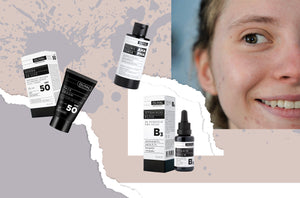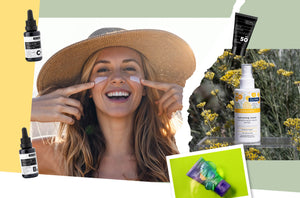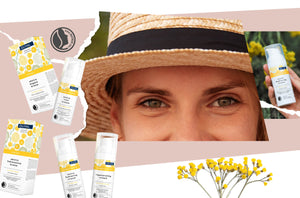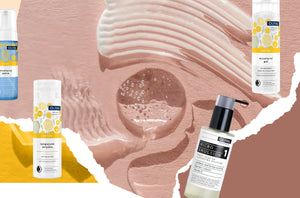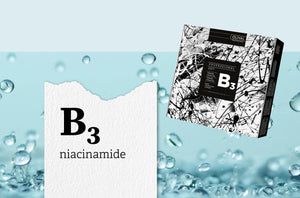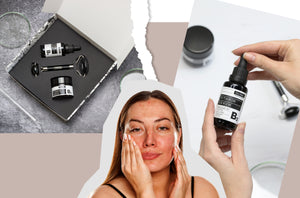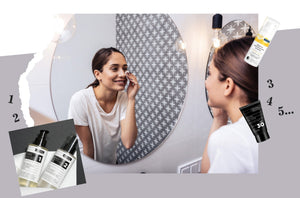You must have heard or read countless times that lemon is great in face masks. Or that toothpaste instantly erases pimples. Find out below what exactly will help you, and what will take a lot of time off in your quest to achieve healthy, attractive and shiny skin.
1. Oily skin does not need cream
It is a myth based on false assumptions. Absolutely every skin, even the one that produces the most sebum, i.e. fat, requires a certain amount of nutrients and water. The difference must be solely in the texture, that is, the ingredients of the cleansers, serums and creams you use. If you have oily skin, choose a preparation that is non-comedogenic, that is, it does not clog pores and at the same time does not cause irregularities. The luck in the accident is that such skin very quickly shows what exactly bothers it. Because of this, as a rule, you can immediately recognize whether a certain oil or other ingredient in cosmetics suits you. In addition, there are numerous free search engines available on the Internet with which you can easily check comedogenicity, as well as other details about the ingredients.
2. Darker skin cannot burn in the sun
Despite the certain dangers it radiates, the sun still has a number of irreplaceable advantages. However, this does not mean that we should be in the sun from morning to night with completely unprotected skin or only with a few coats of olive oil. The common belief that darker skin does not suffer the consequences of exposure to the sun's rays is very wrong. Although there is more melanin, a kind of natural shield against solar radiation, it still affects skin cells and penetrates deep into its layers. That's why you need a protective factor during the first, but also the fifteenth tanning session of the season.

3. Homemade masks are better than purchased ones
Various sites and magazines are simply screaming with recipes and incentives for making natural cosmetics from ingredients you have in your own kitchen. The analogy that what you eat is good for your skin may sound good, but unfortunately, it does not have a good foundation in truth. Quite the opposite – ingredients like lemon and cinnamon act as irritants on the skin . They damage the integrity of the skin's surface, and can trigger an allergic reaction in more sensitive skin. Toothpaste is a good example. Ingredients such as menthol and other aggressive substances should definitely not be applied to the inflamed surface, which is essentially what a pimple is.
Also, what is natural may not always be ideal for topical application. For example, if homemade cream contains no preservatives and is hand-packaged, there is always the possibility of rancidity or, worse, bacterial contamination due to uncontrolled packaging conditions. A good assessment of products, ingredients, and even the packaging itself, is the key to beautiful skin.
4. The appearance of acne depends only on the wrong choice of cosmetics
You bought a new cream and, along with a new face wash and serum, happily introduced it into your routine. However, after a day or two, you are greeted by rows of pimples on your forehead, so you immediately conclude that the cause must be hidden in the cream in which you had so much faith. Unfortunately, such "diagnosis" is by no means reliable. Why?
Because it may or may not be correct. In order to be absolutely sure that a specific cosmetic product is the cause of your skin troubles, you must test it. In translation, you have to go back to your usual care routine, and then reintroduce the cream you suspect, without adding any new products to your routine. In addition, the appearance of irregularities is influenced by a considerable number of factors, from the menstrual cycle, hormonal picture, diet to weather conditions, even the clothes and fashion accessories you wear.
5. Cosmetics should be chosen exclusively according to age
The shelves of drugstores and pharmacies are increasingly full of various cosmetic preparations and their derivatives. Ironically, as the offer grows, it becomes more and more difficult for us to find what we are looking for, which is usually the "most common" face cream. Of course, the beauty industry decided to make the search easier by roughly dividing care according to age. And although it is not entirely her fault, every skin is different and experiences the inevitable aging process differently. Someone will experience a loss of firmness and tone at the age of 35, while another person will notice it only at the age of three. For this reason, it is important to listen to your own body and skin and respond to its requests in a timely manner.
6. Hyperpigmentation occurs only in older skin
We may disappoint you, but annoying spots of various sizes are not reserved only for mature skin. Hyperpigmentation, in fact, appears very easily and is very difficult to remove. Especially if the dedicated preparations for their relief are not used consistently, according to the recommended instructions and without continuous protection from the sun.
But first of all, it is important to arm yourself with patience, but also to correctly determine the origin of the stain. Stains caused by exposure to the sun, healing of an injury, but also due to changes in the hormonal picture during pregnancy and menopause are easier to alleviate than those we are born with. Besides, it doesn't matter how old the stain is or where it is.

7. Make-up does not bother, especially if it is thoroughly removed
The claim that the skin breathes or "must breathe" is not true at all. But, on the other hand, it is certainly not good for her that most days she is covered with a layer of powder and other decorative coatings. This especially applies to the bases that are increasingly popular, and they bear marks of durability expressed in hours. Whenever you can, be without makeup, and instead of a kind of mask that does nothing good for the skin, prefer to wear a CC cream on your face . It will equalize possible redness and differences in skin tones with equal strength, and at the same time provide the skin with much-needed vitamin, nourishing care and moisture, just like a regular face cream.


